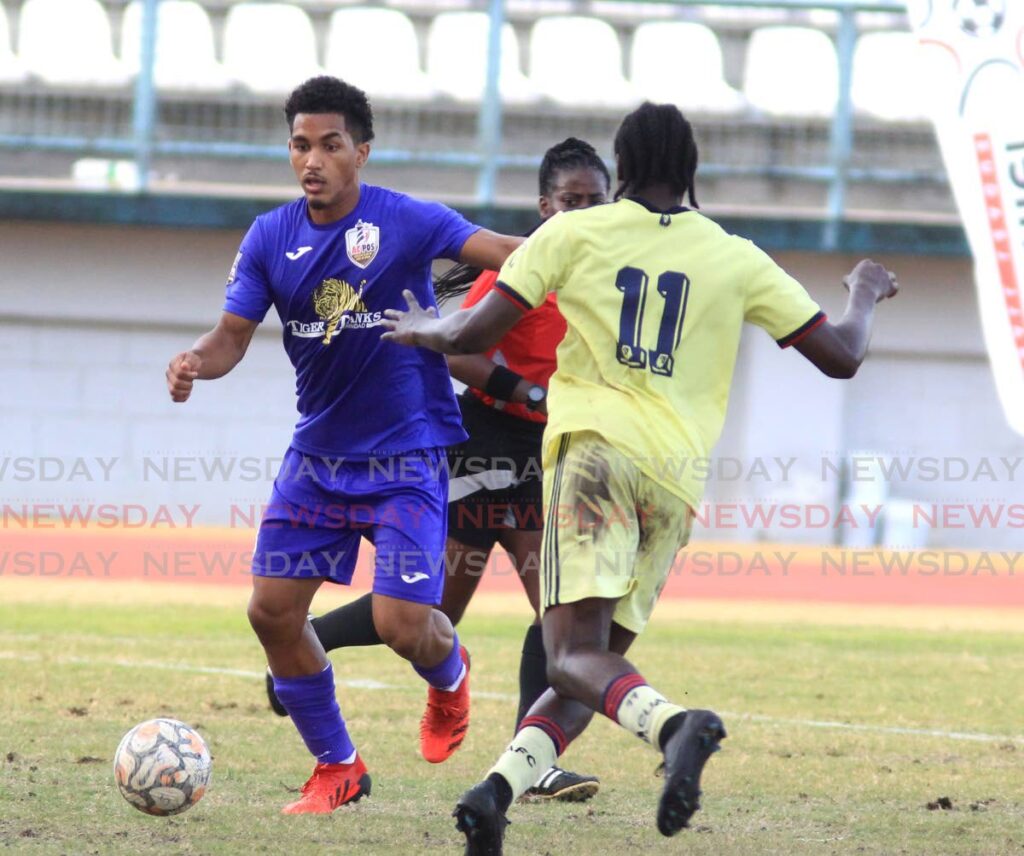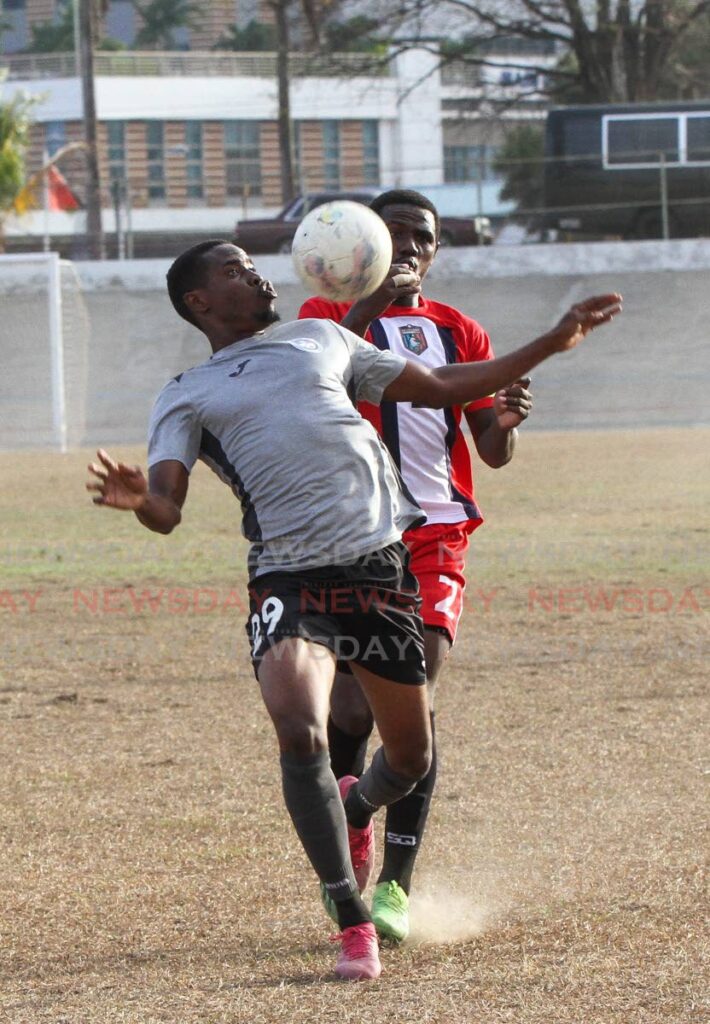The haves and have nots in TT Premier Football League

MANY youths around the world dream of playing football professionally.
Whether it is the English Premier League, La Liga in Spain or Serie A in Italy, a professional career in football is the goal.
After two years lost owing to the covid19 pandemic, local footballers breathed a sigh of relief when it was announced that the Trinidad and Tobago Premier Football League (TTPFL) would kick off on March 10. The league, which replaced the Pro League, is the top tier of football in TT, with the expectation that it would help produce the next crop of national footballers.
The Government has pledged its financial support to the league and FIFA has also invested in it.
The Ministry of Sport and Community Development has committed $3 million per year to the league for the first three years.
FIFA is assisting to the tune of US$300,000 and $400,000 per year.
Matches are being broadcast live on Sportsmax and streamed live on the FIFA+ app.
However, several coaches and players have lamented that the money is not enough to run an entire league with each squad, including staff, comprising approximately 30 members.
Some teams have been struggling to run their programmes since the league kicked off. The allocation allows for $50,000 to be spread across each team per month, which includes paying up to approximately 25 players and five technical staff members.
One coach in the TTPFL said he can only afford to pay some of his players a stipend between $1,200 and $1,500 per month. Additionally, he said players are paid a small match fee of $250 for starters.
Grateful to return to action
A player, who wished to stay anonymous, said footballers are grateful to be back on the field again.
The midfielder (player X) said, “For some people, football is all we have. For it starting, it is a plus. It is motivation again to the dream. It have some youths who want to go further like myself. It is a good thing that we have football back again in Trinidad again. For a country who had high standards in football, we not supposed to be where we at right now. Having the league back again is a plus.”
TT are currently ranked 104th in the world in the FIFA men's rankings.

Another player (Y) said, “It is a very good feeling to be outside…playing week in and week out because we went nearly two years without football.”
Player Y, 20, recently left school and is solely counting on football to survive.
He has dreams of making it to the pinnacle of the sport.
“I want to make it a career, reach as far as possible…I really enjoy the sport. I see it as a lifestyle more than anything else. The quality of the league not bad, the football playing good. At the end of the day, if you are a footballer in the country your goal should really be to go outside and play…play in bigger leagues.”
Talent lost because of low pay
Player Y said a generation is being lost as a number of talented players are choosing other jobs over football.
“It have some players, youths just like me, say they not playing in the league because it not really making sense. They not making any money.
“According to where you living in the country you might have to go a certain distance to reach training and it costing (a lot) – and is talented players, they could play. If we continue like this we will lose players we did not even know we had,” he said.
He said some players play minor-league football and work other jobs to supplement their income.
Player X said football should be seen as a profession just like any other job.
“We will never reach anywhere if we don’t fix it. A footballer should be a footballer; somebody who working in the government should work in the government; if you working corporation, you working corporation, or whatever it is. It not supposed to be going to train hard and still have to look for a next job.”
Player X said footballers need some level of security to play to their full potential.
"Men will do it half-hearted. Football will not be their number-one priority. I would always bring up Jamaica. In Jamaica, football is their number-one priority. So who is we?
"We could never reach (if we continue like this)…Our football still stagnant. We have a lot of talented youths in Trinidad here, (but) I don’t know what we studying in TT. We supposed to be studying World Cup 2026. We have to get it right. We are not going to reach nowhere.”
Running a club on shoe-string budget
There is a huge disparity in players' salaries around the league, with some earning around $12,000 at a top club.
At another club, Newsday understands that national players earn at least $7,000.
One coach at a struggling club spoke to Newsday about the difficulty in running a professional club on a shoe-string budget.

PHOTO:ANGELO MARCELLE -
“It has been very tough,” he said.
He said transportation costs between $2,000 to $2,500 on matchdays.
He said it is a challenge finding players willing to accept the monthly stipend of $1,200 to $1,500, and this would have an effect on the team's performance.
“You don’t have to be good. You just have to willing to play for that. They don’t have to be good any more…we try to work with them.”
For most of his players, football is their only source of income.
“I have plenty youths (on my team) who not working. 75 per cent of my team not working. I have about four or five big players…maybe they might be 26, but they working.”
He said acquiring sponsors is very difficult and lamented that gate receipts are taken by the league.
Player X said another burden footballers bear is the cost of gears
“$1,200 is a football boots. Yes, it might have some players who getting $1,200 (a month). I don’t think for a country who have money we should be going through these things.”
Player Y said footballers often buy their own boots, but the club will offer to help if needed.
With rising crime a concern for society, player X said sport is the solution.
“Football takes away crime; football brings love back. We have to do a little better when it comes to that because as I said, this is where their bread and butter is. A rent is $2,000 so they still have to go out there and work.”
More interest is needed according to player Y, to earn revenue. “More fans have to come out. The ministry has to put out more money for the clubs and help them out because what they giving is not really enough to sustain a club.”
League trying to earn revenue
A source who works with the league said work is being done to increase revenue and support.
It was announced on the league’s Facebook page recently that two sponsors came on board.
Blue Waters and Sunshine Snacks are now partners for the tier one season and the league is hopeful they will have more sponsors by the time the knock-out phase kicks off in June.
The source is optimistic that the league can only improve in the future as sponsors will be more willing to come forward as the league becomes established.
The source said clubs do benefit from the gate receipts as once venue expenses are covered, the league and the home team split the remainder. The source did not indicate whether it was a 50-50 split.
Some clubs have been proactive in raising funds by setting up concession stands and selling merchandise at matches.
At games, some fans can be seen wearing team jerseys and numbers of their favourite players.
There are also half-time give-aways and fun activities for fans to promote fan engagement.
Football remains arguably the most popular sport in the country but its professional league is still in a development stage with many challenges still to iron out.


Comments
"The haves and have nots in TT Premier Football League"